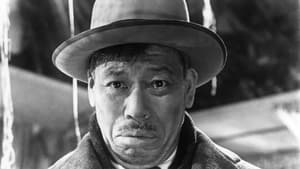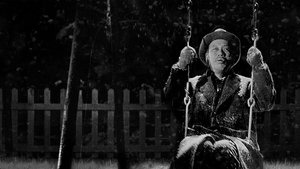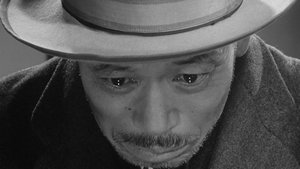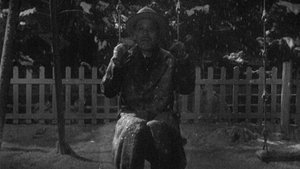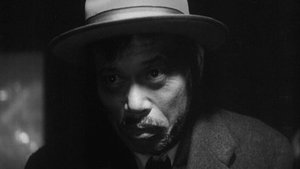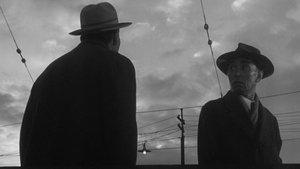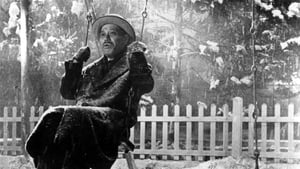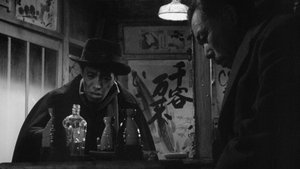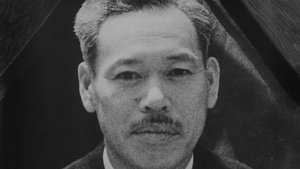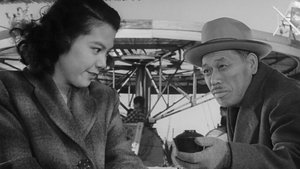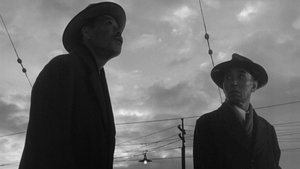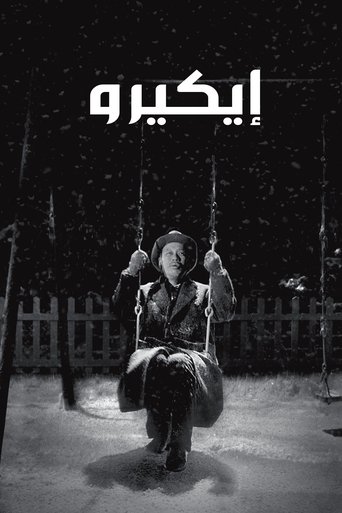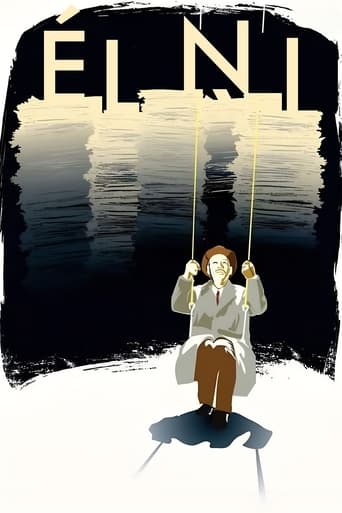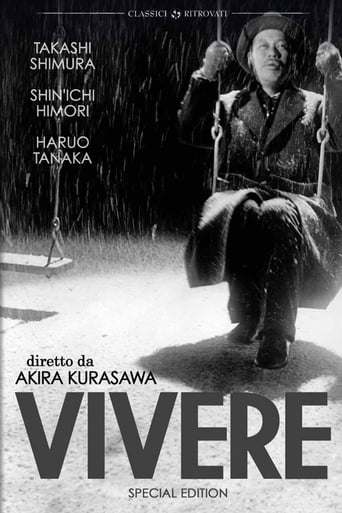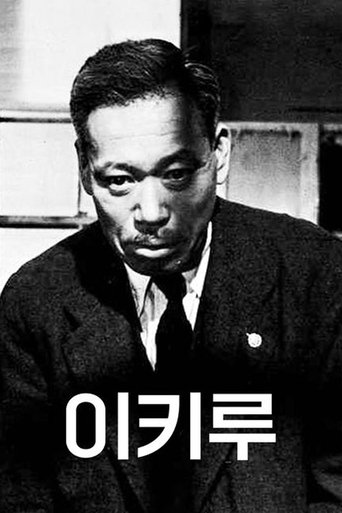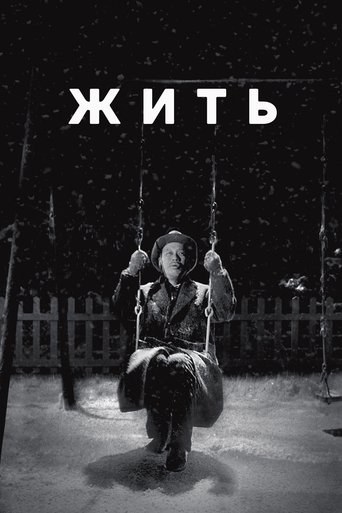
Ikiru
A big story of a little man which will grip your soul...
1952 | 143m | Japanese
Popularity: 3 (history)
| Director: | Akira Kurosawa |
|---|---|
| Writer: | Hideo Oguni, Akira Kurosawa, Shinobu Hashimoto |
| Staring: |
| Kanji Watanabe is a middle-aged man who has worked in the same monotonous bureaucratic position for decades. Learning he has cancer, he starts to look for the meaning of his life. | |
| Release Date: | Oct 09, 1952 |
|---|---|
| Director: | Akira Kurosawa |
| Writer: | Hideo Oguni, Akira Kurosawa, Shinobu Hashimoto |
| Genres: | |
| Keywords | bureaucracy, japan, age difference, office, night life, sense of life, dying and death, playground, praise, obsequies, swing, office politics, infatuation, wake, public works, bureaucrat, thoughts of retirement, terminal cancer, city park, civil servant, monotonous life, accomplishments, office gossip, burocracia, terceira idade |
| Production Companies | TOHO |
| Box Office |
Revenue: $55,240
Budget: $0 |
| Updates |
Updated: Nov 05, 2025 Entered: Nov 05, 2025 |
| Name | Character |
|---|---|
| Takashi Shimura | Kanji Watanabe |
| Haruo Tanaka | Sakai |
| Nobuo Kaneko | Mitsuo, son of Kanji |
| Bokuzen Hidari | Ohara |
| Miki Odagiri | Toyo |
| Shinichi Himori | Kimura |
| Minoru Chiaki | Noguchi |
| Minosuke Yamada | Subordinate Clerk Saito |
| Kamatari Fujiwara | Sub-Section Chief Ono |
| Makoto Kobori | Kiichi Watanabe, Kanji's Brother |
| Nobuo Nakamura | Deputy Mayor |
| Atsushi Watanabe | Patient |
| Isao Kimura | Intern |
| Masao Shimizu | Doctor |
| Yūnosuke Itō | Novelist |
| Yoshie Minami | The Maid |
| Kumeko Urabe | Tatsu Watanabe |
| Eiko Miyoshi | Housewife |
| Noriko Honma | Housewife |
| Yatsuko Tan'ami | Bar Hostess |
| Kin Sugai | Housewife |
| Kyôko Seki | Kazue Watanabe |
| Kusuo Abe | City Assemblyman |
| Tomo'o Nagai | Newspaperman |
| Seiji Miyaguchi | Yakuza Boss |
| Daisuke Katō | Yakuza |
| Hiroshi Hayashi | Yakuza |
| Fuyuki Murakami | Newspaperman |
| Hirayoshi Aono | Newspaperman |
| Toranosuke Ogawa | Park Section Chief |
| Akira Sera | Worker in General Affairs |
| Ichirō Chiba | Policeman |
| Akira Tani | Bar Owner |
| Yōyō Kojima | Worker in Sewage Section |
| Toshiyuki Ichimura | Pianist |
| Harue Kuramoto | Dancer |
| Rasa Saya | Stripper |
| Taizō Fukami | Baseball Spectator |
| Tateo Kawasaki | Civil Engineering Section Staff |
| Keiichirō Katsumoto | Park Division Staff |
| Haruko Toyama | Cabaret Woman |
| Sachio Sakai | Yakuza (uncredited) |
| Shōichi Hirose | Yakuza (uncredited) |
| Kôji Uno | Yakuza (uncredited) |
| Yaeko Izumo | Housewife (uncredited) |
| Jirô Mitsuaki | City Hall Executive (uncredited) |
| Sôkichi Maki | General Manager (uncredited) |
| Haruo Suzuki | Sanitation Division Receptionist (uncredited) |
| Takeo Nagashima | (uncredited) |
| Kazuo Imai | (uncredited) |
| Shigeo Katō | (uncredited) |
| Hiroshi Akitsu | Infectious Diseases Section Receptionist Staff (uncredited) |
| Ippei Kawagoe | Road Section Receptionist (uncredited) |
| Mitsuo Tsuda | City Planning Receptionist (uncredited) |
| Keiji Sakakida | Land Readjustment Section Receptionist (uncredited) |
| Takuzō Kumagai | Fire Department Staff (uncredited) |
| Tsuneo Katagiri | (uncredited) |
| Junpei Natsuki | Patient (uncredited) |
| Hiroshi Koizumi | Jazz Bar Guest (uncredited) |
| Jun'ichirō Mukai | (uncredited) |
| Sōjirō Motoki | Narrator (voice) (uncredited) |
| Kyoko Aoyama | Schoolgirl (uncredited) |
| Name | Job |
|---|---|
| Asakazu Nakai | Director of Photography |
| Hideo Oguni | Screenplay |
| Akira Kurosawa | Screenplay, Director, Editor |
| Akio Nojima | Set Decoration |
| Shinji Kojima | Lighting Technician |
| Fumio Hayasaka | Original Music Composer |
| Shinobu Hashimoto | Screenplay |
| Ichirô Minawa | Sound Effects Editor |
| Name | Title |
|---|---|
| Sōjirō Motoki | Producer |
| Organization | Category | Person |
|---|
Popularity History
| Year | Month | Avg | Max | Min |
|---|---|---|---|---|
| 2024 | 4 | 20 | 29 | 14 |
| 2024 | 5 | 27 | 40 | 18 |
| 2024 | 6 | 25 | 41 | 13 |
| 2024 | 7 | 29 | 57 | 17 |
| 2024 | 8 | 19 | 32 | 13 |
| 2024 | 9 | 19 | 26 | 15 |
| 2024 | 10 | 22 | 41 | 11 |
| 2024 | 11 | 18 | 25 | 14 |
| 2024 | 12 | 21 | 30 | 13 |
| 2025 | 1 | 19 | 25 | 14 |
| 2025 | 2 | 14 | 22 | 3 |
| 2025 | 3 | 6 | 17 | 1 |
| 2025 | 4 | 4 | 7 | 2 |
| 2025 | 5 | 4 | 8 | 3 |
| 2025 | 6 | 4 | 6 | 3 |
| 2025 | 7 | 3 | 4 | 2 |
| 2025 | 8 | 3 | 4 | 2 |
| 2025 | 9 | 4 | 5 | 3 |
| 2025 | 10 | 5 | 6 | 3 |
| 2025 | 11 | 5 | 7 | 3 |
| 2025 | 12 | 5 | 7 | 3 |
| 2026 | 1 | 5 | 8 | 3 |
| 2026 | 2 | 3 | 3 | 3 |
Trending Position
| Year | Month | High | Avg |
|---|---|---|---|
| 2026 | 1 | 691 | 734 |
| Year | Month | High | Avg |
|---|---|---|---|
| 2025 | 11 | 720 | 784 |
Takashi Shimura is "Watanabe", an elderly civil service lifer who is told that he has terminal stomach cancer. After years of a disciplined, rather pedestrian existence he now feels a need to emancipate himself and start to live a little. The story is told through two threads: one looks at the end o ... f the old gent's life from his own perspective; the second takes a retrospective view from the wake as his family and colleagues gather to remember him. Kurusawa is clearly making a point with this delicate, poignant film - perhaps life needs to be appreciated and enjoyed - not necessarily in a jovial, happy fashion, but by achievement. In this case "Watanabe" sets about using his position to help locals get a park, but he also starts an empowering relationship (platonic) with a younger girl, who is quite keen on her food, it has to be said. As his colleagues at the wake suffer from excesses of saké their traditionally stiff, reserved, view of their late friend becomes more of a tool to evaluate their own roles and purpose as they determine to be more like him.... The writing has plenty of humour and again, Kurosawa uses weather as a wonderfully potent instrument to create a great atmospheric feel to this gentle story of profound change, and - maybe - contentment.
I watched the English follow-up version (Living) before watching this original, and wished I had reversed my order. I liked Living much more than this original, but since both were written by the same Japanese scriptwriter, my preference might be cultural rather than due to quality issues, not to me ... ntion the scriptwriter had come up with improvements through the intervening years. The club and bar scenes near the beginning seem to go on much longer than in the remake, or at least it felt like it! And the same for the later scenes with the young woman. Then again, that wouldn’t be surprising since this older version is 40 minutes longer. Still, the differences in the details based on the separate cultures are interesting to note, and I recommend both versions, though I would start with the older one as I mentioned above.
Typical Kurasawa creative framing in the beginning of the movie. The scene of dancers shot through bead curtains swinging in time to the music was brilliant. His choice of Miki Odagiri for muse is brilliant. Her laugh is infectious. The last act stuck me as rather static. It's perhaps from cultural ... mores about the dead I don't understand (like the taboo of not ever sticking your chopsticks into the rice bowl!). Kurasawa waxes philosophical on life and government here, and indeed, nothing has changed in 70 years.











![Ikiru (1952) Original Trailer [4K]](/extra_thumbs/geKhyNerWM8.jpg)

